Scientists
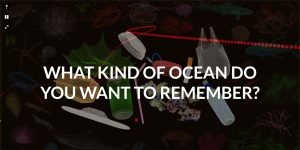
Diving into an Acidifying Ocean – Q&A
Cristina Tarquini (IT/FR), Frédéric Gazeau (FR) & Freya Murray (UK)
Join the Q&A with the artist who created the online experiment and the scientist who advised her.
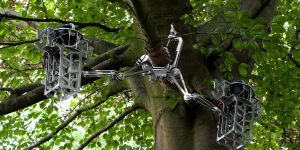
Garden Exhibition
Kepler's Garden am Campus der JKU
Die Garden Exhibtion am Campus der JKU in Linz widmet sich dem Zusammenspiel von Kunst, Forschung und Industrie/Design. Ausgewählte Kunstwerke greifen die Metapher des Gartens spielerisch und in unterschiedlicher Weise auf.
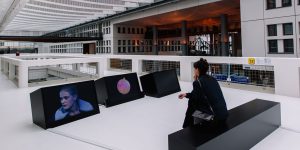
(UN)REAL
Science Gallery Network (INT)
The Science Gallery Garden at the Ars Electronica Festival will explore trust, technology, global challenges, arts innovation and new forms of digital storytelling. A showcase from the world’s only university network dedicated to public engagement with science and art, it will feature interactive workshops, experimental audio and visual experiences, livestreamed events and a specially-curated digital archive.
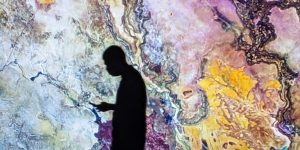
Supraspectives
Quadrature (DE)
Audiovisual installation, developed with local (citizen) science and astronomy community during an Art-and-Science Residency at the Medialab of Tabakalera, Spain.
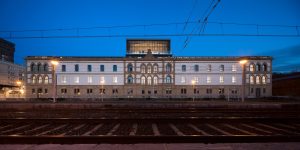
Tabakalera San Sebastian and Ars Electronica Linz
Tabakalera (ES)
Tabakalera is celebrating together with Ars Electronica its 5 years celebration. This installation will be the centerpiece of the program to celebrate the fifth anniversary, during the weekend of Sept. 11 and 12.
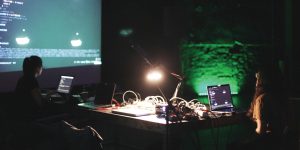
On Code. The Uncertainty Of Meaning And Doing
Lina Bautista (CO), Daniel Moreno Roldán (ES), Agnès Pe (ES), Ángel Faraldo (ES), Carolina Jiménez (ES), Lluís Nacenta (ES)
ROUNDTABLE: How does code interfere with the listening process? Code allows the ear to navigate the listening interface, while it happens to narrow its sensitive scope. It crosses the interface, the membrane which separates but also connects, unfolding the vibration of the air, the zone of inter/intra-action, negotiation and distribution of attention and meanings, between the (dis)orders of the emitted and the heard sounds.

Facing Uncertainty and Its Discontents
Pau Alsina (ES), Roc Parés (ES/MX), Marina Garcés (ES), Joan Soler-Adillon (ES), Tere Badia (ES), Pau Waelder (ES).
ROUNDTABLE: While we get used to dealing with those events in which the probability of a certain situation occurring is not known: what does it mean to live in a context of uncertainty? How to take the risk of uncertainty and try to slide their gains? How arts, sciences, technologies and thought have learned from it and propelled their practices of uncertainty?
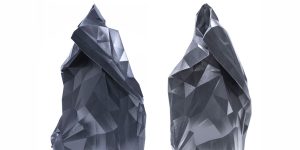
Uncertainty with AI-terity
Koray Tahiroğlu (FI/TR)
The composition Uncertainty keeps the musician in a hesitant state of performance, providing a non-rigid but identifiable musical events, followed by ever shifting new sounds. Uncertainty is a composition written for the AI- terity instrument that comprises computational features of a particular artificial intelligence (AI) model to generate relevant audio samples for real- time audio synthesis. The unusual behaviour of the Al-terity puts the performer in an uncertain state during performance. Together with being able to move through timbre-changes in sonic space, the emergence of new sounds allows the musician to explore a whole new range of musical possibilities. Composition turns into a continuous state of playing, reformulating an idiomatic relationship with the Al-terity and opening up a fresh variety of musical demands.
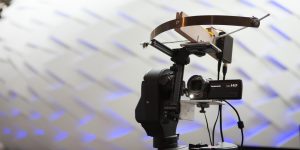
#festivalstories
Lennard Barth (AT), Celine Fahrngruber (AT), Samuel Gerersdorfer (AT), Joshua Haiden (AT), Elias Illig (AT), Sophie Kaufmann (AT), Irina Pitterle (AT) Xaver Quintus (AT)
Junge Filmemacher*innen, junge Talente, Young Professionals sind aufgefordert, Minidokumentarfilme zu drehen, die ihre Perspektiven und Eindrücke von den Themen des Festivals festhalten. Anstelle einer allgemeinen Festivaldokumentation werden acht Kurzgeschichten produziert, die verschiedene Slots und Protagonist*innen enthalten.
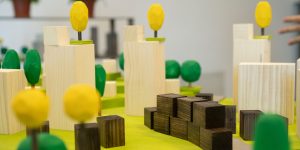
Baukasten der Zukunft
Louise Amcha (AT), Hannah Ertl (AT), Leonid Stanislav Lang (AT) und Marlene Urban (AT)
Der Baukasten der Zukunft ist ein interaktives Gedankenexperiment einer jungen Künstler*innen-Gruppe. Das Projekt besteht aus einem großen, einladenden Holzmodell einer Landschaft, in welcher die Besucher*innen ihre eigene Stadt planen können. Ergänzend dazu baut ein Computerprogramm per Knopfdruck unter denselben Bedingungen auch eine Version einer Stadt. Anschließend gilt zu bewerten, welche Vor- und Nachteile jede Version mit sich bringt und welche Lösung die beste für unsere Zukunft wäre.
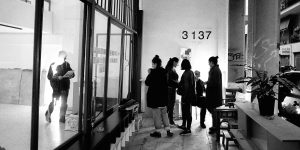
Creative Question Challenge: Hybrid forms of being together
3 137 (GR), Audrey-Flore Ngomsik (FR), Christos Carras (UK/GR)
"Lasst uns beenden, was wir begonnen haben." Auf diese Weise stellt die UNO ihr erstes Ziel für nachhaltige Entwicklung vor - das Ende der Armut in allen Formen und Dimensionen bis 2030. Die 17 Ziele der Nachhaltigen Entwicklung und ihre 169 Teilziele wurden als ein ausuferndes, missverständliches Durcheinander großer Absichten beschrieben. Allein der Titel der Entwicklungsagenda - "Unsere Welt umgestalten" - verströmt utopische Ambitionen. Er wurde 2015 von 193 Nationen angenommen. Fünf Jahre später und mit zehn verbleibenden Jahren: Wie wird sich unsere Welt verändern?
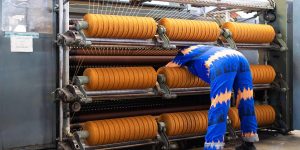
Creative Question Challenge: Examining organic and digital ecosystems
Hypercomf (GR), Markos Digenis (GR)
Will there be no poverty and zero hunger across the world in ten years? Is this planet to be populated in ten years by billions of healthy and educated humans? Is comfortability or autonomy more important to well-being? Can you be comfortably autonomus? These are the questions scientists were asked who applied to an open call to collaborate with artists in the STUDITOPIA residency program.
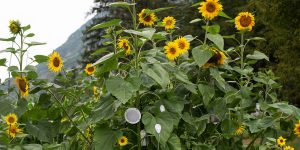
Unnatural Language: Botanic Quartet
Scott Kildall - Xenoform Labs (US), Michael Ang (CA)
Botanic Quartet is a generative musical composition by four plants endemic to Thailand. The results constitute a sort of ecospheric sentience as the plants don’t only respond to the sensed data, but communicate it to each other. This is a project under the umbrage of Unnatural Language, an ongoing collaboration between Scott Kildall and Michael Ang. Scott Kildall has been working with art, technology and education for over 15 years, looking at the interplay between territory and technology.
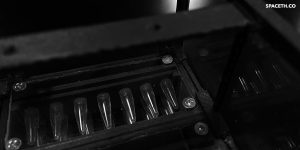
MESSE: Molecular Encoding Storage for Space Exploration
Spaceth.co (TH)
MESSE is an anti-disciplinary payload aboard the New Shepard spacecraft, launched into a sub-orbital trajectory 100 kilometers above, and explores weightlessness in the space environment. The payload contains bio-synthetically created DNA encoding “Kwam-Fhan-Kab-Chakarawan” (Aspiration and the Universe), a famous Thai song by artist Bodyslam, to demonstrate the algorithm that can encode and decode data into DNA. The science experiment will be conducted both before and after the spaceflight to study the products of DNA assembling in space and its preservation on several sample materials. This will allow the researchers to understand the possibility of DNA storage as a form of preserving knowledge or sending any data in the form of a molecular encoding message. This mission represents aspects of science and humanity and guidelines for future citizen space exploration in Thailand.
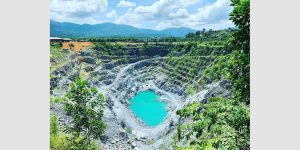
Making of Lunar Pearl
Henryandpartners (TH), SpaceZab (TH)
Pearl of Lunar explores infrastructural desire and the future of Belt-and-Road Initiatives as seen through wealth accumulation, labor infiltration, and geopolitical control; but also, more ephemerally, the affective meshwork of possessiveness and greed that functions at the individual and corporate level. Lunar Rock is a project by SpaceZab, a group of young scientists’ journey into Trad city, a rocky seaside landscape. They wade through rocks and the oceanside, excavating magmatic rock from the shore and the sea. The quest is to discover earth elements resembling moon dust for their future research and experiments.

Creative Question Challenge: Human being and "soft" technologies
Christiaan Zwanikken (NL), DM Hoyt (US), Emmanuel Grimaud (FR)
"Lasst uns beenden, was wir begonnen haben." Auf diese Weise stellt die UNO ihr erstes Ziel für nachhaltige Entwicklung vor - das Ende der Armut in allen Formen und Dimensionen bis 2030. Die 17 Ziele der Nachhaltigen Entwicklung und ihre 169 Teilziele wurden als ein ausuferndes, missverständliches Durcheinander großer Absichten beschrieben. Allein der Titel der Entwicklungsagenda - "Unsere Welt umgestalten" - verströmt utopische Ambitionen. Er wurde 2015 von 193 Nationen angenommen. Fünf Jahre später und mit zehn verbleibenden Jahren: Wie wird sich unsere Welt verändern?
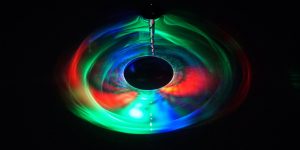
Creative Question Challenge: Between scientific discovery and perceptual expansion
Dmitry Gelfand & Evelina Domnitch (NL/BY), Guillaume Schweicher (BE/LU), Florian Schreck (DE)
Let us finish what we started'. This is how the UN introduces its first Sustainable Development Goal - to end poverty in all forms and dimensions by 2030. The 17 Sustainable Development Goals and their 169 targets have been described as a sprawling, misconceived mess of grandiose intentions. The title of the development agenda itself - 'Transforming our World' - oozes utopian ambition. It was adopted by 193 nations in 2015. Five years later and with ten years left, how do you think our world will transform?
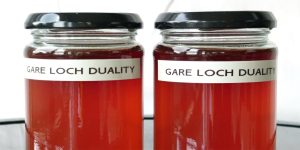
Psychological Impacts of Surveillance: within the context of Gare Loch Duality and the #UndesiredLine
B. D. Owens, David Harper, Darren Ellis (UK)
Multi-disciplinary artist, B. D. Owens, has a conversation with Professor David Harper & Dr Darren Ellis (University of East London) about the psychological impacts of surveillance, within the context of Gare Loch Duality and the #UndesiredLine.
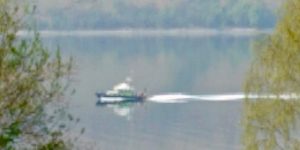
Gare Loch Duality and the #UndesiredLine - Live
B.D. Owens, Donna Holford-Lovell
Two new films by B.D. Owens followed by a live Q&A with the artist and NEoN Director, Donna Holford-Lovell.

Gare Loch Duality and the #UndesiredLine
B.D. Owens, Donna Holford-Lovell
B. D. Owens takes the viewer on an interactive wander through the landscape, artistic process and historical context of his ongoing, multifaceted project Gare Loch Duality and the #UndesiredLine.


